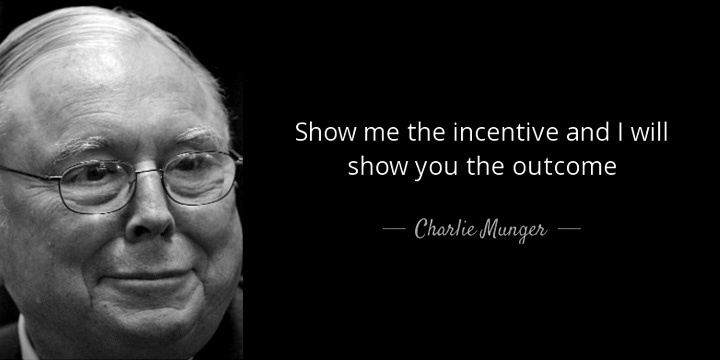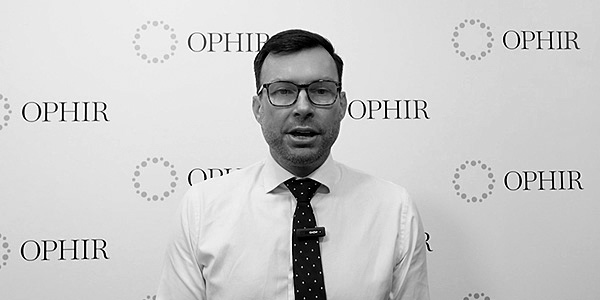In our Investment Strategy Note we discuss aligning incentives of a funds management business with investors, including how we do this at Ophir.
Fees and structure: How portfolio managers can align with investors and avoid damaging conflicts of interest
Selecting the right portfolio manager can be an individual investor’s most important decision. A vital factor when investors decide which fund to invest in are how the fees and the fund’s business model are structured, which in turn determine the portfolio manager’s incentives.
As Charlie Munger, Warren Buffett’s long-term business partner at Berkshire Hathaway has remarked, “you show me the incentive, I’ll show you the outcome”. At Ophir, we are strong believers in Charlie’s edict that incentives drive behaviours and behaviours drive outcomes.
So we have endeavoured to structure our fees and business – and therefore our incentives — in a way that provides the best outcome for our investors.
Indeed, we believe that investors, advisors, and portfolio managers, should review closely what successful structures look like that deliver strong outcomes for both portfolio managers and investors; but that, importantly, also avoid potentially damaging conflicts of interest.
The potential for conflicts of interest
Good portfolio managers are extremely rare and valuable, so investors are generally willing to pay for their expertise.
Unfortunately, if not properly structured, the fees which investors pay can create conflicts of interest and lead the investment manager to adopt a sales-driven culture, a culture that ultimately harms investors, rather than a performance-driven culture, a culture that benefits investors.
So how can conflicts emerge?
The potential for conflicts of interest between investors and their advisors is dubbed the “principal-agent problem”. It happens because investors (the principal) have inferior access to information compared to the investment manager (the agent).
If the wrong incentives are in place, portfolio managers may use their superior information to serve their own interest rather than the best interests of their investors.
For example, a manager might continue raising capital from investors long past the point that it begins hurting investor returns. This point may only be easily observable to the manager as it impacts their day to day trading in companies. This conflict can often arise if the manager is strongly focussed on a sales orientated culture or the majority of their revenue is tied closely to the amount of money they raise and manage.
Robust performance measurement
The first step in managing and minimising these potential conflicts is objective and rigorous measurement of investment performance.
Detailed performance measures not only measure the skill of a portfolio manager, but they guide how the investment manager will eventually be remunerated for performance.
Investors, therefore, must pay close attention to how this information is presented to them, particularly regarding two things:
- When measuring investment returns, they should focus on the investment fund’s total return, which comprises both price changes and the receipt of dividends.
- When comparing the performance of the fund with a market index, only like-for-like comparisons are useful. The performance of the portfolio manager, for example, should be compared against the total return index that best represents the manager’s investment strategy.
Creating Alignment
After robust performance measurement, the next step to avoiding conflicts of interest is to strive to best align the interest of its clients and investors with that of the owners and portfolio managers.
At the heart of that alignment is a remuneration structure where the portfolio manager’s pay is largely dictated by, and commensurate with, the long-term investment returns the fund has delivered to its investors.
But alignment also requires an attitude, stance and culture. At Ophir, for example, we believe that the success of our business is a shared responsibility in which everyone at our firm plays a part. Similarly, we see our investors as ‘business partners’, knowing that the growth and success of our business is dependent on growing our investors’ wealth.
Our three keys to alignment
So how do we align our business with our investors? There are three key things we have in place to help ensure alignment between us and our investors:
1.Full ownership
Firstly, the business is fully owned by our two Co-Founders and Senior Portfolio Managers who also lead our Investment Team. This ensures the buck stops with the Investment Team and there are no outside owners to meddle with the firm’s business strategy. By owning the business fully, the Senior Portfolio Managers signal their long-term commitment. This can involve significant personal financial sacrifices, particularly through periods when returns are not so strong. Senior Portfolio Managers may also be required to contribute to the business in good times when the firm is growing and requires the reinvestment of profits that would have otherwise been paid out to the owners.
2. Symmetrical performance fee hurdles
Secondly, the business is designed with a symmetrical performance fee hurdle on each Ophir Fund where outperformance is incentivised to the same degree in both up and down markets. Given the constrained nature of the size of the Ophir Funds, base management fees and hence staff base salaries (paid from these fees) are constrained, so the business and Investment Team are incentivised primarily through generating superior benchmark outperformance.
3. Co-investment
Finally, we require all staff at Ophir to invest in the Ophir Funds. This principle is so important to us that all of the Co-Founders’ and Senior Portfolio Managers’ investable wealth is in the Ophir Funds. There is no better way of seeing things from your investors’ perspective than being one of them. Indeed, the Ophir Funds represent the Family Office of each member of the Ophir Investment Team, such is the significant level of our co-investment. This helps ensure that no matter what the highs and lows our investors are going through, we are going through them right alongside them.
Building long-term trust
We believe the senior management of a fund management business are responsible for striking the right balance between performance-based rewards for the business and its investment staff, and generating strong and consistent long-term returns for fund investors.
Ultimately, the firm’s best interests are served when both these factors are guided by a process which is both detailed and transparent.
No funds management business will be successful unless it firstly establishes and nurtures trust between the investors and the business.
However, investors must always be aware that conflicts of interest are not uncommon in the financial services industry. The key to managing these conflicts is by having transparency on the fee and performance structure. The right fee structure does not ensure the portfolio will always perform as hoped, but it does provide a framework which guides a sensible investment strategy with the appropriate level of risk taking.




